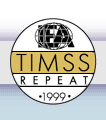
 |
|
|
TIMSS 1999 assessed students' mathematics and science achievement in 38 countries at the eighth grade. In each country, nationally representative samples of approximately 3,500 eighth-grade students (ages 13 and 14 years old) students were assessed in about 150 schools. Target Population The target population for the 1999 assessment was defined as "the upper of the two adjacent grades with the most 13-year-olds." In most countries this is the eighth grade, and for trend countries this matches the upper grade assessed in 1995. Sample Design TIMSS 1999 used a two-stage sampling procedure to ensure a nationally representative sample of students. In the first stage, schools were randomly selected, and in the second stage, classrooms were randomly selected within schools. In each participating country, approximately 150 schools were randomly selected for the assessment. In each school, one or two mathematics classrooms of eighth-grade students were randomly selected for a total of about 3,500 eighth-grade students in each country. The same sampling procedures were used for the 1995 eighth-grade assessment. |
||||||
|
|